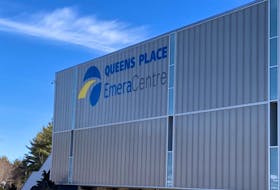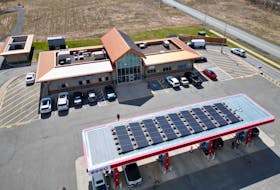After a difficult two-hour meeting with Pictou Landing community and band members, the band council decided to accept and sign on to an agreement in principle with the provincial government that will see firm timelines by June 2015 on ending the flow of effluent into Boat Harbour.
Paul and Environment Minister Randy Delorey signed the document Monday.
"(The) government is committed to cleaning up Boat Harbour," said Delorey. "Building trust among the First Nations community and the broader Pictou area community is going to take time. That's what this agreement is all about."
In return, the band agreed to dismantle its blockade of the road leading to the site of the effluent leak from Northern Pulp Nova Scotia Corp. near Indian Cross Point in Pictou Landing.
“This is a historic day,” said Paul. “At the community meeting, the elders spoke loud and clear. They are ready to trust the government once again and have asked us to take down the blockade. We have ended our protest.”
Since the effluent leak was discovered last Tuesday morning, the mill has been in shut-down mode. A peaceful blockade assembled after it was discovered that the leak was near a First Nations burial grounds. By late yesterday afternoon, all but a handful of protesters had dispersed.
David MacKenzie, governmental affairs and communications manager with Northern Pulp, said it’s been a long week for the company’s workers and their families and that he’s glad to see they can get on with repairing the pipe and starting up the mill again.
“We’re happy to see this going forward,” he said.
Boat Harbour, a tidal lagoon within Pictou Landing First Nation, has been leased by the province to be used by Northern Pulp as an effluent treatment facility for the past 47 years.
With the signing of the agreement in principle, the government commits to enacting into law timelines on stopping the flow of effluent into Boat Harbour and the site’s remediation by June 30, 2015.
“We will be at the table with the province to make sure the treatment facility will be closed as soon as possible,” said Paul. “I have the personal assurance of the premier and Minister Delorey that the province is prepared to spend whatever it takes to make this happen.”
The agreement states that if a suitable agreement isn’t reached by June 2015 after good faith negotiations, the province will pay the band $1 million.
Premier McNeil stated the agreement formalizes government's commitment to remediate Boat Harbour.
“I am pleased constructive work is underway, and I'm very optimistic that the province is on track to a solution that works for everyone.”
According to Delorey, it is too soon to say where and how much an alternative location for an effluent treatment facility will cost. The band puts the relocation cost at around $100 million.
“It’s not over yet. The entire community is watching,” said Paul. “It’s now up to the province to deliver.”
MacKenzie said that the inside of the effluent pipe will have to be examined and repairs done to it, but their goal is to have the pulp mill operational by the end of this week.
On Twitter: @NGNewsJohn
TIMELINE
THE BOAT HARBOUR LEGACY:
1964 – Scott Maritimes decides to build a mill at Abercrombie Point. The province agrees to provide adequate supplies of clean water to the mill as well as a place to discharge the wastewater after its use in pulping. Boat Harbour treatment facility established.
1965 – The Pictou Landing First Nations chief and council state concerns about odour. The province and Scott Maritimes take them on a trip to Saint John, N.B., to show them there is no smell. They agree in principle while on the trip.
1965 – A resolution is signed for an immediate lump sum payment of $60,000 in consideration of the permanent loss of fishing and hunting revenue and other benefits derived from the use of the land, with a final settlement to be subject to further negotiations between the province and Indian Affairs.
1967 – Mill begins operating.
1986 – Pictou Landing First Nation begins action against the federal government for breach of fiduciary duty in the case of Boat Harbour.
1991 – The federal government agrees to negotiate a settlement with Pictou Landing. The province promises to abate the adverse effects of the wastewater when the agreement with Scott Maritimes expires in 1995.
1993 – An agreement with the federal government is reached out of court. Pictou Landing First Nations is supposed to receive $35 million.
1995 – There is no alternative site identified by the time the Scott Maritime agreement expires; the province promises Boat Harbour will be closed by December 2005.
2000 – A study by Kimberly Clark shows the cost of building a replacement treatment facility will cost between $48-60 million. A plan is launched to build a pipeline directly to the channel instead.
2004 – Mill ownership is transferred to Neenah Paper.
2005 – The province and Neenah state that a pipeline is not feasible as it would not likely pass environmental assessment. They ask for an extension to December 2008.
2008 – Province agrees to extend licence after December 2008 on a month-to-month basis.
2008 – The business transfers to Northern Pulp. The province asks that Pictou Landing not protest the extension of the licence to Dec. 31, 2008, and promises not to extend it beyond that date without further consultation.
2008 – Band council chief writes to province advising them they will not agree to any further extensions.
2009 – The band council begins meeting with a negotiator, but meetings halt following the June 2009 provincial election. Talks don’t resume until September, when the current minister of transportation asks for time to study the issue.
2010 – Pictou Landing First Nations asks the province to terminate the licence, effective June 30. The date passes with no change.
2010 –A lawsuit is filed against the province and Northern Pulp.
2014 – An effluent leak in the pipeline near Indian Cross Point sparks a peaceful protest that seeks a commitment from the province for firm deadlines in finding a more suitable location for Northern Pulp’s effluent and the remediation of Boat Harbour. Agreement in principle signed by Pictou Landing First Nation chief and Minister of Environment.
After a difficult two-hour meeting with Pictou Landing community and band members, the band council decided to accept and sign on to an agreement in principle with the provincial government that will see firm timelines by June 2015 on ending the flow of effluent into Boat Harbour.
Paul and Environment Minister Randy Delorey signed the document Monday.
"(The) government is committed to cleaning up Boat Harbour," said Delorey. "Building trust among the First Nations community and the broader Pictou area community is going to take time. That's what this agreement is all about."
In return, the band agreed to dismantle its blockade of the road leading to the site of the effluent leak from Northern Pulp Nova Scotia Corp. near Indian Cross Point in Pictou Landing.
“This is a historic day,” said Paul. “At the community meeting, the elders spoke loud and clear. They are ready to trust the government once again and have asked us to take down the blockade. We have ended our protest.”
Since the effluent leak was discovered last Tuesday morning, the mill has been in shut-down mode. A peaceful blockade assembled after it was discovered that the leak was near a First Nations burial grounds. By late yesterday afternoon, all but a handful of protesters had dispersed.
David MacKenzie, governmental affairs and communications manager with Northern Pulp, said it’s been a long week for the company’s workers and their families and that he’s glad to see they can get on with repairing the pipe and starting up the mill again.
“We’re happy to see this going forward,” he said.
Boat Harbour, a tidal lagoon within Pictou Landing First Nation, has been leased by the province to be used by Northern Pulp as an effluent treatment facility for the past 47 years.
With the signing of the agreement in principle, the government commits to enacting into law timelines on stopping the flow of effluent into Boat Harbour and the site’s remediation by June 30, 2015.
“We will be at the table with the province to make sure the treatment facility will be closed as soon as possible,” said Paul. “I have the personal assurance of the premier and Minister Delorey that the province is prepared to spend whatever it takes to make this happen.”
The agreement states that if a suitable agreement isn’t reached by June 2015 after good faith negotiations, the province will pay the band $1 million.
Premier McNeil stated the agreement formalizes government's commitment to remediate Boat Harbour.
“I am pleased constructive work is underway, and I'm very optimistic that the province is on track to a solution that works for everyone.”
According to Delorey, it is too soon to say where and how much an alternative location for an effluent treatment facility will cost. The band puts the relocation cost at around $100 million.
“It’s not over yet. The entire community is watching,” said Paul. “It’s now up to the province to deliver.”
MacKenzie said that the inside of the effluent pipe will have to be examined and repairs done to it, but their goal is to have the pulp mill operational by the end of this week.
On Twitter: @NGNewsJohn
TIMELINE
THE BOAT HARBOUR LEGACY:
1964 – Scott Maritimes decides to build a mill at Abercrombie Point. The province agrees to provide adequate supplies of clean water to the mill as well as a place to discharge the wastewater after its use in pulping. Boat Harbour treatment facility established.
1965 – The Pictou Landing First Nations chief and council state concerns about odour. The province and Scott Maritimes take them on a trip to Saint John, N.B., to show them there is no smell. They agree in principle while on the trip.
1965 – A resolution is signed for an immediate lump sum payment of $60,000 in consideration of the permanent loss of fishing and hunting revenue and other benefits derived from the use of the land, with a final settlement to be subject to further negotiations between the province and Indian Affairs.
1967 – Mill begins operating.
1986 – Pictou Landing First Nation begins action against the federal government for breach of fiduciary duty in the case of Boat Harbour.
1991 – The federal government agrees to negotiate a settlement with Pictou Landing. The province promises to abate the adverse effects of the wastewater when the agreement with Scott Maritimes expires in 1995.
1993 – An agreement with the federal government is reached out of court. Pictou Landing First Nations is supposed to receive $35 million.
1995 – There is no alternative site identified by the time the Scott Maritime agreement expires; the province promises Boat Harbour will be closed by December 2005.
2000 – A study by Kimberly Clark shows the cost of building a replacement treatment facility will cost between $48-60 million. A plan is launched to build a pipeline directly to the channel instead.
2004 – Mill ownership is transferred to Neenah Paper.
2005 – The province and Neenah state that a pipeline is not feasible as it would not likely pass environmental assessment. They ask for an extension to December 2008.
2008 – Province agrees to extend licence after December 2008 on a month-to-month basis.
2008 – The business transfers to Northern Pulp. The province asks that Pictou Landing not protest the extension of the licence to Dec. 31, 2008, and promises not to extend it beyond that date without further consultation.
2008 – Band council chief writes to province advising them they will not agree to any further extensions.
2009 – The band council begins meeting with a negotiator, but meetings halt following the June 2009 provincial election. Talks don’t resume until September, when the current minister of transportation asks for time to study the issue.
2010 – Pictou Landing First Nations asks the province to terminate the licence, effective June 30. The date passes with no change.
2010 –A lawsuit is filed against the province and Northern Pulp.
2014 – An effluent leak in the pipeline near Indian Cross Point sparks a peaceful protest that seeks a commitment from the province for firm deadlines in finding a more suitable location for Northern Pulp’s effluent and the remediation of Boat Harbour. Agreement in principle signed by Pictou Landing First Nation chief and Minister of Environment.








